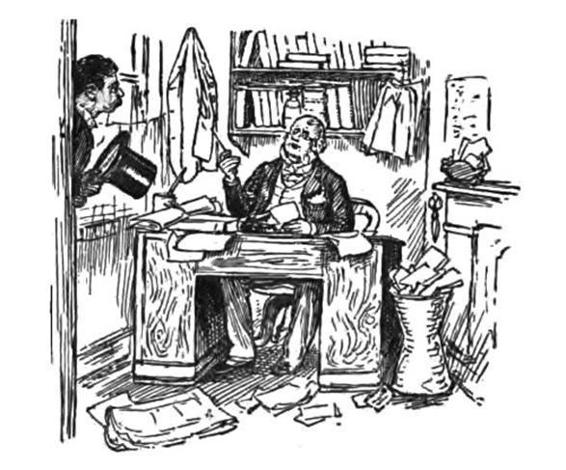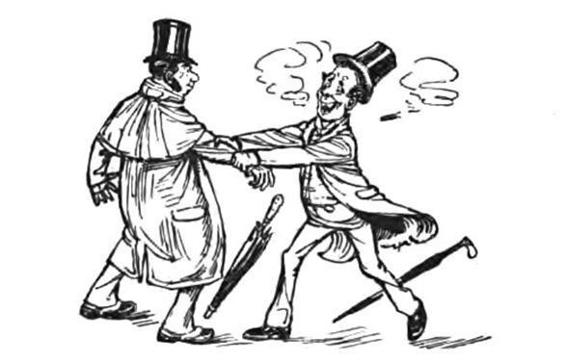Delphi Complete Works of Jerome K. Jerome (Illustrated) (Series Four) (392 page)
Read Delphi Complete Works of Jerome K. Jerome (Illustrated) (Series Four) Online
Authors: Jerome K. Jerome

“You know, babies,” she was remarking in conclusion, “ain’t like dollies. Babies is ‘live. Nobody gives you babies till you’re growed up. An’ they’re very improper. We’re not s’posed to talk ‘bout such things —
we
was babies once.”
She is a very thoughtful child, is my eldest niece. Her thirst for knowledge is a most praise-worthy trait in her character, but has rather an exhausting effect upon the rest of the family. We limit her now to seven hundred questions a day. After she has asked seven hundred questions, and we have answered them, or, rather, as many as we are able, we boycott her; and she retires to bed, indignant, asking:
“Why only seven hundred? Why not eight?”
Nor is her range of inquiry what you would call narrow or circumscribed at all. It embraces most subjects that are known as yet to civilisation, from abstract theology to cats; from the failure of marriage to chocolate, and why you must not take it out and look at it when you have once put it inside your mouth.
She has her own opinion, too, about most of these matters, and expresses it with a freedom which is apt to shock respectably-brought-up folk. I am not over-orthodox myself, but she staggers even me at times. Her theories are too advanced for me at present.
She has not given much attention to the matter of babies hitherto. It is only this week that she has gone in for that subject. The explanation is — I hardly like mentioning it. Perhaps it — I don’t know, I don’t see that there can be any harm in it, though. Yet — well, the fact of the matter is, there is an “event” expected in our family, or rather, in my brother-in-law’s; and there! you know how these things get discussed among relatives, and May — that is my niece’s name — is one of those children that you are always forgetting is about, and never know how much it has heard and how much it has not.
The child said nothing, however, and all seemed right until last Sunday afternoon. It was a wet day, and I was reading in the breakfast-parlour, and Emily was sitting on the sofa, looking at an album of Swiss views with Dick Chetwyn. Dick and Emily are engaged. Dick is a steady young fellow, and Emily loves him dearly, I am sure; but they both suffer, in my opinion, from an over-sense of modesty. As for Emily, it does not so much matter: girls are like that before they are married. But in Dick it seems out of place. They both of them flare up quite scarlet at the simplest joke even. They always make me think of Gilbert’s bashful young couple.

Well, there we were, sitting round, the child on the floor, playing with her bricks. She had been very quiet for about five minutes, and I was just wondering what could be the matter with her, when, all of a sudden, and without a word of warning, she observed, in the most casual tone of voice, while continuing her building operations:
“Is Auntie Cissy goin’ to have a little boy-baby, or a little girl-baby, uncle?”
“Oh, don’t ask silly questions; she hasn’t made up her mind yet.”
“Oh, oh! I think I should ‘vise her to have a little girl, ‘cause little girls ain’t so much trouble as boys, is they? Which would you ‘vise her to have, uncle?”
“Will you go on with your bricks, and not talk about things you don’t understand? We’re not supposed to talk about those sort of things at all. It isn’t proper.”
“What isn’t p’oper? Ain’t babies p’oper?”
“No; very
im
proper, especially some of them.”
“Umph! then what’s people have ’em for, if they isn’t p’oper?”
“Will you go on with your bricks, or will you not? How much oftener am I to speak to you, I wonder? People can’t help having them. They are sent to chasten us; to teach us what a worrying, drive-you-mad sort of world this is, and we have to put up with them. But there’s no need to talk about them.”
There was silence for a few minutes, and then came:
“Does Uncle Henry know? He’ll be her puppa, won’t he?”
“Eh! What? Know what? What are you talking about now?”
“Does Uncle Henry know ‘bout this baby that Auntie Cissy’s goin’ to have?”
“Yes, of course, you little idiot! — Does Uncle Henry know!”
“Yes — I s’pose they’d tell him, ‘cause, you see, he’ll have to pay for it, won’t he?”
“Well, nobody else will if he doesn’t.”
“It costs heaps and
heaps
and HEAPS of money, a baby, don’t it?”
“Yes, heaps.
“Two shillin’s?
“Oh, more than that!”
“Yes, I s’pose they’re very ‘spensive. Could I have a baby, uncle.’
“Oh, yes; two.’
“No, really! On my birthday?”
“Oh, don’t be so silly! Babies are not dolls. Babies are alive! You don’t buy them. You are given them when you are grown up.”
“Shall
I
have a baby when
I’m
growed up?”
“Oh, it all depends! And don’t say, ‘growed up.’ You’ve been told that before. It’s ‘grow
n
up,’ not ‘grow
ed
up.’ I don’t know where you get your English from.”
“When I’m grow
n
ed up, then. Shall I have a baby when I’m growned up?”
“Oh, bother the child! Yes, if you’re good and don’t worry, and get married.”
“What’s ‘married’? What mumma and puppa is?”
“Yes.”
“And what Auntie Emily and Mr. Chetwyn is goin’ to be?”
“Yes; don’t talk so much.”
“Oh! can’t you have a baby ‘less you’re married?”
“No, certainly not.”
“Oh! Will Auntie Emily have a—”

“GO ON WITH YOUR BRICKS! I’ll take those bricks away from you, if you don’t play quietly with them. You never hear me or your father ask silly questions like that. You haven’t learnt your lessons for to-morrow yet, you know.”
Confound the child! I can’t make out where children get their notions from, confounded little nuisances!
Let me see, what was I writing about? Oh! I know, “Tea-kettles.” Yes, it ought to be rather an interesting subject, “Tea-kettles.” I should think a man might write a very good article on “Tea-kettles.” I must have a try at it one of these days!
A PATHETIC STORY
“OH! I WANT YOU TO WRITE the pathetic story for the Christmas number, if you will, old man,” said the editor of the ——
Weekly Journal
to me, as I poked my head into his den one sunny July morning, some years ago. “Thomas is anxious to have the comic sketch. He said he overheard a joke last week, that he thinks he can work up. I expect I shall have to do the cheerful love story about the man that everybody thinks is dead, and that turns up on Christmas eve and marries the girl, myself. I was hoping to get out of it this time, but I’m afraid I can’t. Then I shall get Miggs to do the charitable appeal business. I think he’s the most experienced man we have now for that; and Skittles can run off the cynical column, about the Christmas bills, and the indigestion: he’s always very good in a cynical article. Skittles is; he’s got just the correct don’t-know-what-he-means-himself sort of touch for it, if you understand.”

“Skittles,” I may mention, was the nickname we had given to a singularly emotional and seriously inclined member of the staff, whose correct cognomen was Beherhend.
Skittles himself always waxed particularly sentimental over Christmas. During the week preceding that sacred festival, he used to go about literally swelling with geniality and affection for all man and womankind. He would greet comparative strangers with a burst of delight that other men would have found difficult to work up in the case of a rich relation, and would shower upon them the good wishes, always so plentiful and cheap at that season, with such an evident conviction that practical benefit to the wishee would ensue therefrom as to send them away labouring under a vague sense of obligation.
The sight of an old friend at that period was almost dangerous to him. His feelings would quite overcome him. He could not speak. You feared that he would burst.

He was generally quite laid up on Christmas-day itself, owing to having drunk so many sentimental toasts on Christmas-eve. I never saw such a man as Skittles for proposing and drinking sentimental toasts. He would drink to “dear old Christmas-time” and to “dear old England”; and then he would drink to his mother, and all his other relatives, and to “lovely woman,” and “old chums,” or he would propose “Friendship,” in the abstract, “may it never grow cool in the heart of a true-born Briton,” and “Love — may it ever look out at us from the eyes of our sweethearts and wives,” or even “The Sun — that is ever shining behind the clouds, dear boys — where we can’t see it, and where it is not of much use to us.” He was so full of sentiment, was Skittles!
But his favourite toast, and the one over which he would become more eloquently lugubrious than over any other, was always “absent friends.” He appeared to be singularly rich in “absent friends.” And it must be said for him that he never forgot them. Whenever and wherever liquor was to his hand, Skittles’s “absent friends” were sure of a drink, and his present friends, unless they displayed great tact and firmness, of a speech calculated to give them all the blues for a week. Folks did say at one time that Skittles’s eyes usually turned in the direction of the county jail when he pledged this toast; but on its being ascertained that Skittles’s kindly remembrance was not intended to be exclusive, but embraced everybody else’s absent friends as well as his own, the uncharitable suggestion was withdrawn.
Still, we had too much of these “absent friends,” however comprehensive a body they may have been. Skittles overdid the business. We all think highly of our friends when they are absent — more highly, as a rule, than we do of them when they are not absent. But we do not want to be always worrying about them. At a Christmas party, or a complimentary dinner to somebody, or at a shareholders’ meeting, where you naturally feel good and sad, they are in place, but Skittles dragged them in at the most inappropriate seasons. Never shall I forget his proposing their health once at a wedding. It had been a jolly wedding. Everything had gone off splendidly, and everybody was in the best of spirits. The breakfast was over, and quite all the necessary toasts had been drunk.
It was getting near the time for the bride and bridegroom to depart, and we were just thinking about collecting the rice and boots with which to finally bless them, when Skittles rose in his place, with a funereal expression on his countenance and a glass of wine in his hand.
